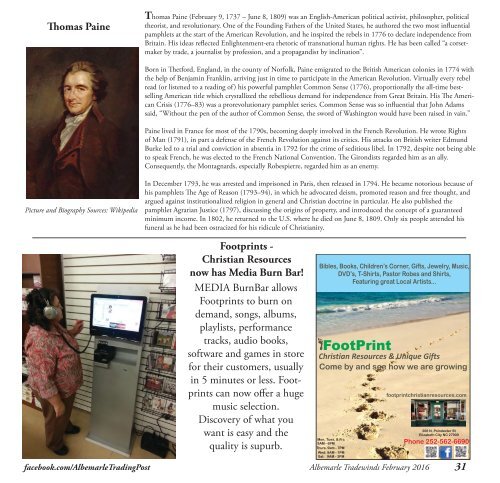Albemarle Tradewinds February 2016 Final Web
February 2016
February 2016
You also want an ePaper? Increase the reach of your titles
YUMPU automatically turns print PDFs into web optimized ePapers that Google loves.
Thomas Paine<br />
Thomas Paine (<strong>February</strong> 9, 1737 – June 8, 1809) was an English-American political activist, philosopher, political<br />
theorist, and revolutionary. One of the Founding Fathers of the United States, he authored the two most influential<br />
pamphlets at the start of the American Revolution, and he inspired the rebels in 1776 to declare independence from<br />
Britain. His ideas reflected Enlightenment-era rhetoric of transnational human rights. He has been called “a corsetmaker<br />
by trade, a journalist by profession, and a propagandist by inclination”.<br />
Born in Thetford, England, in the county of Norfolk, Paine emigrated to the British American colonies in 1774 with<br />
the help of Benjamin Franklin, arriving just in time to participate in the American Revolution. Virtually every rebel<br />
read (or listened to a reading of) his powerful pamphlet Common Sense (1776), proportionally the all-time bestselling<br />
American title which crystallized the rebellious demand for independence from Great Britain. His The American<br />
Crisis (1776–83) was a prorevolutionary pamphlet series. Common Sense was so influential that John Adams<br />
said, “Without the pen of the author of Common Sense, the sword of Washington would have been raised in vain.”<br />
Paine lived in France for most of the 1790s, becoming deeply involved in the French Revolution. He wrote Rights<br />
of Man (1791), in part a defense of the French Revolution against its critics. His attacks on British writer Edmund<br />
Burke led to a trial and conviction in absentia in 1792 for the crime of seditious libel. In 1792, despite not being able<br />
to speak French, he was elected to the French National Convention. The Girondists regarded him as an ally.<br />
Consequently, the Montagnards, especially Robespierre, regarded him as an enemy.<br />
Picture and Biography Sources: Wikipedia<br />
In December 1793, he was arrested and imprisoned in Paris, then released in 1794. He became notorious because of<br />
his pamphlets The Age of Reason (1793–94), in which he advocated deism, promoted reason and free thought, and<br />
argued against institutionalized religion in general and Christian doctrine in particular. He also published the<br />
pamphlet Agrarian Justice (1797), discussing the origins of property, and introduced the concept of a guaranteed<br />
minimum income. In 1802, he returned to the U.S. where he died on June 8, 1809. Only six people attended his<br />
funeral as he had been ostracized for his ridicule of Christianity.<br />
Footprints -<br />
Christian Resources<br />
now has Media Burn Bar!<br />
MEDIA BurnBar allows<br />
Footprints to burn on<br />
demand, songs, albums,<br />
playlists, performance<br />
tracks, audio books,<br />
software and games in store<br />
for their customers, usually<br />
in 5 minutes or less. Footprints<br />
can now offer a huge<br />
music selection.<br />
Discovery of what you<br />
want is easy and the<br />
quality is supurb.<br />
<br />
<br />
<br />
<br />
<br />
<br />
<br />
<br />
<br />
<br />
<br />
<br />
<br />
<br />
<br />
facebook.com/<strong>Albemarle</strong>TradingPost <strong>Albemarle</strong> <strong>Tradewinds</strong> <strong>February</strong> <strong>2016</strong> 31

















